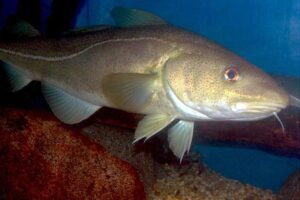
New research on Atlantic cod, led by scientists at Rutgers University, concludes that if properly managed, stocks of the popular white fish may rebound, now that commercial fishing pressure has been reduced.
The study, published in the Philosophical Transactions of the Royal Society B: Biological Sciences, offers the first genomic evidence that Atlantic cod evolved new traits over only decades during a period of overfishing – evolutionary changes that scientists formerly believed could take millions of years.
“The discovery was made possible by new technology that allowed us to extract and read the genetic code of cod, some caught more than 110 years ago, as well as new analytical techniques that detect subtle changes in that genetic code,” said Malin Pinsky, senior author on the study and an associate professor in the Department of Ecology, Evolution and Natural Resources at Rutgers School of Environmental and Biological Sciences (SEBS).
Atlantic cod live in cold waters and deep-sea regions throughout the North Atlantic. With their mild flavor and dense, flay flesh, codfish is one of the most common ingredients in fish and chips.
Previous research had shown that by the end of the 20th century that any overfished cod had developed what appears to be a survival advantage, to mature earlier and grow less large, making them less likely to be singled out to be caught and more likely to reproduce before being caught.
Searches for transformations in key genes turned out to be unsuccessful, so researchers posed a different question: what if changes were occurring in many genes at once, rather than a few?
Brendan Reid, first author of the study and a postdoctoral associate at Rutgers, said that through their research they were able to show that many genes throughout the genome, a complete set of genetic material within the organism, did shift in the same way in cod from both sides of the Atlantic Ocean over the past 100 years.
“This suggests that cod did indeed evolve in response to fishing through small changes in many genes, something we didn’t have clear evidence for before in any overfished species,” he said.
In the 1990s, due to overfishing, Atlantic cod populations dropped to 1% of historical levels.
Researchers noted that starting in the 1970s that trawlers equipped with advanced radar and sonar systems allowed commercial fishermen to collect cod from a larger area, and fish deeper and for longer periods of time than ever before.
Cod stocks fell faster than they could be replenished, ultimately leading to the collapse of the fishery, and its rapid evolution.
This new research offers hope for possible re-emergence of the codfish population, which has been slowly rebounding since fishing pressure has been reduced, researchers said.
